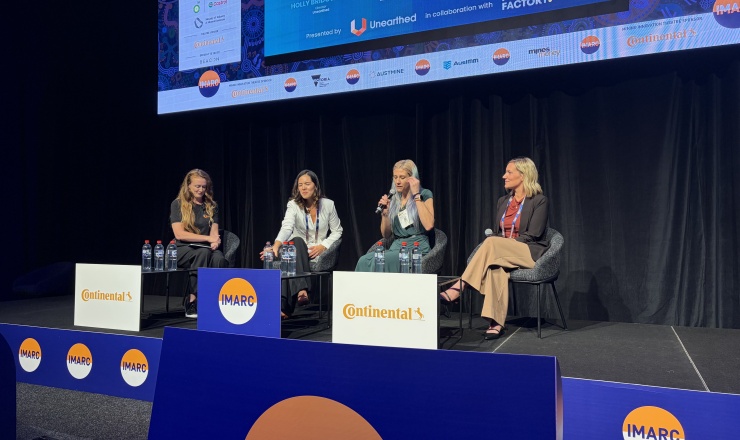
Funding the Future of Mining Tech at IMARC 2025
Hosted by Unearthed in collaboration with Founders Factory , our session “Funding the Future of Mining Tech” brought together a
Read articleNowadays it is becoming common place for Australian startups to leverage the mentorship and investor relationship benefits of an incubator or accelerator program to assist in getting their companies off the ground.
Most of these programs have a similar structure and typically offer office space, industry mentors, seed funding, legal advice and entrepreneurial expertise, in return for equity in the company.
Some of the oldest and most well-known programs include Y-combinator, Techstars, and the Founder Institute, all of whom take equity, but with varying inclusions and conditions.
The Founder Institute, who have branches across Australia, including one in Perth, has a formula to “globalise Silicon Valley”, which involves talent, training and teamwork. The teamwork portion of this equation involves founders paying a set course fee and contributing 3.5% equity into a shared liquidity pool, that is then split between other graduates, mentors and the institute.
In addition, if a graduate startup is successful and receives significant financing from third parties, the institute asks that the company pay a one-time tuition fee, which supplies the growth capital for the institute. In their own words:
“the success of the Institute is based on the success of the graduates, as it should be[1]”.
The returns of capital from equity stakes in these accelerators have allowed them to anchor sustainable tech startup ecosystems. They continue to reinvest returns, and have created a critical mass, which is required to attract founders and venture capital, change culture, and generally create the conditions required for the rapid creation of profitable new ventures.
Australian programs Muru-D (backed by Telstra) and Vocus Upstart are both examples of accelerators who take equity in return for their program benefits. Australia would do well to pay attention to what works in this approach, while adapting it to an Australian context.
Occasionally accelerator programs encounter questions about whether taking equity in participating companies creates a conflict of interest. This is a bit surprising, given that the opposite is true, according to Justin Strharsky, Director at Unearthed:
“equity stakes are the best way we know of to align interests”.
So, what ongoing motivations do business services and consulting programs claiming to be accelerators have to assist companies after they graduate? When a program has an equity stake, they are absolutely driven to see the new venture succeed well beyond graduation, and are regulated in their behaviour by standards of corporate governance and the specifics of shareholder agreements.
At this point in the development of accelerator programs, those claiming not to take any equity in participating companies should bear the greater burden of proof in relation to potential conflicts of interest. One should inquire of them, "what's in it for you?" For those who take an equity position in participating companies, ‘what's in it for them’ could not be more transparent and clear.
As at 30th June 2015, venture capital funds under management in Australia totalled A$2.6 billion[2]. However, we’re not even close to investing as much capital in early stage startups as other ecosystems. With a venture capital per capita figure of $4, Australia is still very much in the shadow of dominant communities, such as Silicon Valley ($4,241 per capita) and Israel ($183 per capita). Melbourne Cup alone boasts a higher level of investment at $52 per capita[3].
Australia needs to increase investment in our developing ecosystem, if we are to reap the rewards that these startups will have to offer. Perth in particular is set to gain from its transition from mining capital to resources technology and innovation hub, as Matthew Macfarlane, Co-Founder and General Partner of Yuuwa Capital LP observed:
“I have been operating Perth's only early stage VC over the last 5 years. The innovation coming from startups and entrepreneurs in the mining sector in the past couple of years has been outstanding. Perth mining tech is leading the world and what these entrepreneurs really need is support in commercialisation and scaling their innovations, this is what accelerators do best.”
It is important for businesses to see the value in corporate venture capital investment, which extends well beyond financial returns. Companies can expect to gain valuable insights into innovative new technologies and ideas, amongst other benefits. Established firms often use corporate venture capital programs for strategic means, including scouting for possible M&A opportunities, supplementing internal R&D departments, or engaging with new, disruptive products or technologies that could potentially pose a threat to their existing business[4].
Besides institutional venture funds, Australia has an abundance of private capital. As at October 2015, there were 440,000 high net worth investors in Australia, with an estimated collective wealth of A$1.55 trillion[5]. If we want to build a competitive startup sector, we’ll need to attract some of these private funds into early-stage startups. Accelerators have a critical role to play in de-risking these early-stage investment opportunities. They can align their interests, those of investors, and the startups they support through equity stakes.
[1] Founder Institute About Page: http://bit.ly/2f3rzIw
[2] AVCAL Venture Capital Fact Sheet April 2016: http://bit.ly/2fbAhRa
[3] Startup WA’s Startup Ecosystem Report, July 2016 (page 28): http://bit.ly/2foKSx6
[4] The Conversation article, entitled: “Corporate venture capital can pay, but only if you get the structure right.” Available: http://bit.ly/1RXS9KF
[5] Investment Trends 2015 High Net Worth Investor Report: http://bit.ly/2eW0l3n